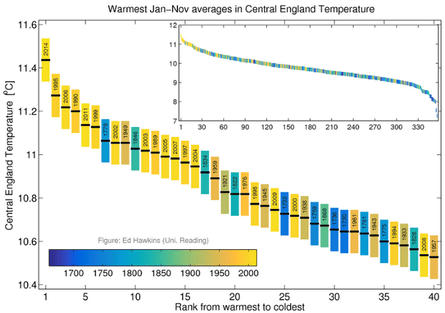Record-breaking hot years in England have become at least 13 times more likely because of manmade climate change, scientists have discovered.
The new study suggests England faces a “significant and substantial increase” of years similar to 2014, which was the hottest on record worldwide and the warmest in England since records beganmore than three and a half centuries ago.
Dr Geert Jan van Oldenborgh from the Royal Netherlands Meteorological Institute, who co-authored the study, said climate change had become so influential on the world’s weather that its effects could be modelled at increasingly local levels.
“Climate change has become so strong over the last 10 to 15 years that you can really sense it now on the local level. Fifteen years ago you could only really see it if you looked at the global mean temperature. And now any old thermometer can show you that the temperatures are increasing,” he said.
The international team used computer models to compare years of natural variation with years with the current level of manmade warming. Lead author Dr Andrew King, from the University of Melbourne, said larger scale continental or global modelling tended to iron out regional variabilities.
“As a result of this low variability, it is easier to spot anomalies. This is why larger regions tend to produce stronger attribution statements, so it is remarkable that we get such a clear anthropogenic influence on temperatures in a relatively small area across central England,” he said.
Central England has the world’s longest running temperature record, dating back to 1659. Van Oldenborgh said the changes observed by weather watchers over the last 356 years matched closely with the findings of the models. He said the 13-fold increase was at the lowest end of predictions and the increase was realistically higher.
The first quarter of this year has already been warm globally, smashing all previous records just months before governments meet in Paris at the end of the year for major UN climate summit.

Van Oldenborgh said record hot years were not useful for indicating the effects of extreme weather under climate change - 2014 did not contain a single record hot month in England despite its overall record. But he said the study was a stepping stone towards being able to isolate the contribution of greenhouse gases to single events, such as the UK’s flooding two winters ago.
“It’s good to show that the Earth is getting warmer. I don’t know if anybody was really impacted by an annual mean high temperature. The numbers here are so big that we think we can go from an annual mean to even smaller scale events, like heat waves and floods,” he said.
Bob Ward, policy and communications director at the Grantham Research Institute on Climate Change at the London School of Economics, said the study provided further evidence that UK’s the weather had begun to respond to climate change in ways that were already affecting people’s lives, from their homes to their health.
“As the atmosphere warms, it can hold more water, leading to heavier rainfall. Many people, particularly farmers and gardeners, are already observing these impacts, for instance, through spring arriving earlier, and a gradual shifts in the location of some plant and animal species. But climate change is also increasing the risk of flooding, both inland from rainfall and along our coasts due to sea level rise, and the risk of heatwaves,” he said.

Comments (…)
Sign in or create your Guardian account to join the discussion